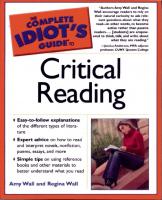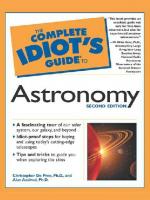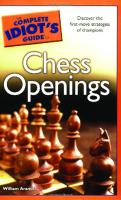
- Author / Uploaded
- Amy Wall
- Regina Wall
The Complete Idiot's Guide to Critical Reading
"Authors Amy Wall and Regina Wall encourage readers to rely on their natural curiosity to ask relevant questions about w
6,081 2,384 6MB
Pages 340 Page size 525 x 646 pts Year 2007
Recommend Papers
File loading please wait...
Citation preview
"Authors Amy Wall and Regina Wall encourage readers to rely on their natural curiosity to ask relevant questions about what they read—in other words, to become active rather than passive readers.... [students] are empowered to think, talk, and write about what they are reading." —Jessica Anderson, MFA adjunct professor, CUNY Queens College
Critical Read i ng • Easy-to-follow explanations of the different types of literature • Expert advice on how to read and interpret novels, nonfiction, poems, essays, and more • Simple tips on using reference books and other materials to better understand what you read
Amy Wall and Regina Wall
U.S. $16.95 ISBN 1 - 5 9 2 5 7 - 3 4 0 - 1
U.K. £12.99 C A N $24.00
5 1695
,f what Get more ou you read! You're no idiot, of course. You know there's a deeper meaning to the books you read in class or in your book club. But sometimes you feel like you're the only one who isn't "getting" it... Don't jump to the wrong conclusions! The Complete Idiot's Guidé1' to Critical Reading offers simple strategies for understanding novels, autobiographies, scientific and philosophical literature, plays, and more. In this Complete Idiot's Guide®, you get: •
Expert guidance on how to interpret aspects of culture and class, language, mood, and tone.
• A section full of commonly used literary terms and their definitions. •
A must-read list of the best literature ever written.
• Things to watch for—and questions to ask yourself—as you read.
AMY W A L L studied at Fairleigh Dickinson University and earned an M.A. in English and American literature from New York University. She lives in Hoboken, New Jersey, and works in Manhattan at CBS News. R E G I N A W A L L taught at Michigan State University, Vanier College, and Concordia University. She has a B.A. and an M.A. from Michigan
781592"573400
Get more information How to develop a critical eye. Strategies for reading scientific, philosophical, and historical books for maximum understanding. What to look for when you're reading a short story, poem, play, or novel. Commonly used literary devices. • The importance of subjectivity and objectivity. • The relationship between author and reader. How to ask the right questions and develop powerful arguments.
State University, and has completed doctoral work through comprehensives for the Ph.D. at the University of Montreal. She lives in Princeton, New Jersey. ISBN 1-59257-340-1 5 1695
Cover image © Lloyd SuttonlMasterfile Visit us online at: www.idiotsguides.com
A ALPHA
781592"573400
Dear Reader: We know why you're about to start your new reading journey: not because you're concerned about how many books you can read, but because you want to know how to get the most out of all your reading experiences. You might, traditionally, be a reader of fiction, never thinking about picking up the works of the great philosophers, historians, or scientists. But if you never read any nonfiction, how would you understand the background and content of a Thomas Hardy novel, for example? The same is true if you are strictly a reader of nonfiction, preferring fact to fiction. My mother and I took on this project together because we know the great value that reading well has had on our own lives and we wrant to help you expand your mind, and reach beyond the confines of the comfortable. Readers who limit themselves to certain types of literary genres and readers who do not think in terms of connections between ideas are often missing the big picture. They are missing the ability to reach across boundaries and personal limitations to new experiences in learning. If you understand the nature of certain philosophies, for example, how do you apply them to life? What a work of fiction can do is actually demonstrate the application of ideas about human existence through storytelling. And through the art of storytelling, you will gain new perspectives on how a particular philosophy affects your own life as well. Learning to read well takes some work on your part—enjoyable, eyeopening work—and a good deal of practice. The point of this book is to explain how you can make reading work for you as a means of developing your mind, body, and spirit. The purpose of reading is to learn and to allow your mind to explore new worlds, experience different adventures, and open up to ideas and ideologies that might be completely different from anything you've ever known. The best way to grow as an individual is through books. We hope that you not only enjoy this book, but learn something new. We hope that you can take what you've learned here and apply it to your reading skills and eventually to your life.
Amy Wall
Regina Wall
About the Authors Amy Wall is a writer and a poet by night, and a TV news producer and newsroom manager by day. She has written several instruction books and has published her poetry in an online literary journal. She is currently working on a novel and continues to write prolifically in her journals with an emphasis on travelogues. Amy's education has focused intensively on art and literature with a special emphasis on British drama when she studied at Wroxton College in Oxfordshire, England, in 1984. Amy graduated cum laude with a B.A. in Communications from Fairleigh Dickinson University in New Jersey in 1986, and continued her studies at New York University in English and American Literature, graduating with a Master of Arts degree in 1994. Amy lives in New Jersey with her boyfriend and their two very silly dogs. When she isn't working she reads, travels, and, of course, writes. Regina Wall lives and works in New Jersey. She currently has a private practice as a psychoanalytic psychotherapist and is affiliated with a family counseling center in her area. She began her career as a writing teacher at Michigan State University and shortly thereafter became a professor of Literature, Humanities, and Women's Studies at Vanier College in Montreal, Canada. Her major areas of study were Comparative Literature, American Literature, Art History, and Women's Studies. She received her Bachelor and Master of Arts degrees from Honors College and Michigan State University. She continued her doctoral studies in literature at the University of Montreal in Canada. Regina is currently working on a novel and has kept journals for 50 years and intends to start some major editing to turn them into a book of memoirs. Regina spends her leisure time at the theater, with books, and with friends. When she isn't traveling all over the world, she is at home in her amazing garden with her cat, Lily. This is the first time Regina and Amy have collaborated on a writing project, and they enjoyed combining their reading experiences to bring you this book.
Critical Reading by Amy Wall and Regina Wall
A member of Penguin Group (USA) Inc.
We would like to dedicate this book to the newest readers in our family: Joe and Matthew Côté, Tara O'Brien, and Madeline Wall. We wish them a lifetime of wonderful reading experiences and newfound knowledge. ALPHA BOOKS Published by the Penguin Group Penguin Group (USA) Inc., 375 Hudson Street, New York, New York 10014, U.S.A. Penguin Group (Canada), 10 Alcorn Avenue, Toronto, Ontario, Canada M4V 3B2 (a division of Pearson Penguin Canada Inc.) Penguin Books Ltd, 80 Strand, London WC2R ORL, England Penguin Ireland, 25 St Stephen's Green, Dublin 2, Ireland (a division of Penguin Books Ltd) Penguin Group (Australia), 250 Camberwell Road, Camberwell, Victoria 3124, Australia (a division of Pearson Australia Group Pry Ltd) Penguin Books India Pvt Ltd, 11 Community Centre, Panchsheel Park, New Delhi—110 017, India Penguin Group (NZ), cnr Airborne and Rosedale Roads, Albany, Auckland 1310, New Zealand (a division of Pearson New Zealand Ltd) Penguin Books (South Africa) (Pty) Ltd, 24 Sturdee Avenue, Rosebank, Johannesburg 2196, South Africa Penguin Books Ltd, Registered Offices: 80 Strand, London WC2R ORL, England
Copyright ©2005 by Amy Wall All rights reserved. No part of this book shall be reproduced, stored in a retrieval system, or transmitted by any means, electronic, mechanical, photocopying, recording, or otherwise, without written permission from the publisher. No patent liability is assumed with respect to the use of the information contained herein. Although every precaution has been taken in the preparation of this book, the publisher and authors assume no responsibility for errors or omissions. Neither is any liability assumed for damages resulting from the use of information contained herein. For information, address Alpha Books, 800 East 96th Street, Indianapolis, IN 46240. THE COMPLETE IDIOT'S GUIDE TO and Design are registered trademarks of Penguin Group (USA) Inc. International Standard Book Number: 1-59257-340-1 Library of Congress Catalog Card Number: 2005920506 07 06 05
8 7 6 5 4
3 2 1
Interpretation of the printing code: The rightmost number of the first series of numbers is the year of the book's printing; the rightmost number of the second series of numbers is the number of the book's printing. For example, a printing code of 05-1 shows that the first printing occurred in 2005. Printed in the United States ofAmerica Note: This publication contains the opinions and ideas of its authors. It is intended to provide helpful and informative material on the subject matter covered. It is sold with the understanding that the authors and publisher are not engaged in rendering professional services in the book. If the reader requires personal assistance or advice, a competent professional should be consulted. The authors and publisher specifically disclaim any responsibility for any liability, loss, or risk, personal or otherwise, which is incurred as a consequence, directly or indirectly, of the use and application of any of the contents of this book. Most Alpha books are available at special quantity discounts for bulk purchases for sales promotions, premiums, fund-raising, or educational use. Special books, or book excerpts, can also be created to fit specific needs. For details, write: Special Markets, Alpha Books, 375 Hudson Street, New York, NY 10014. Publisher: Marie Butler-Knight Product Manager: Phil Kitchel Senior Managing Editor: Jennifer Bowles Senior Acquisitions Editor: Randy Ladenheim-Gil Development Editor: Lynn Northrup Production Editor: Janette Lynn
Copy Editor: Keith Cline Cartoonist: Richard King Cover/Book Designer: Trina Wurst Indexer: Heather McNeil Layout: Ayanna Lacey Proofreading: John Etchison
Contents at a Glance Part 1:
Getting Started: Understanding and Inspection
1 Let's Get Critical What does it mean to be a critical reader? Learn the basic concepts behind improving your reading skills.
1
3
2 Types of Literature: Fiction Learn to identify specific literary genres in the realm of fiction.
19
3 Types of Literature: Nonfiction Develop a solid understanding of what to expect from the nonfiction genres.
31
4 What's Between the Covers? Know your books both inside and out.
41
5 Developing Your Critical Eye 51 Knowing the ins and outs about the author-reader relationship is the first step to developing your critical reading skills. 6 Relating to the Material 63 There are books out therefor everyone. Learn to pay attention to your emotional responses to different works of literature. Part 2:
All About Fiction
75
7 Reading Imaginative Literature 77 Writingfictioninvolves both imagination and skills. Learn more about what drives the creative process. 8 Novel Ways to Pull the Reader In 91 Understanding why the author tells a story a certain way is critical to developing goodfiction-readingskills. 9 Digging Beneath the Obvious: Figurative Language 107 Learn all about how an author uses specific literary techniques to tell a story. 10 How to Read a Poem Did you know there are several different kinds ofpoems? Develop a love of poetry after reading this chapter!
119
iv
The Complete Idiot's Guide to Critical Reading 11 How to Read a Short Story 139 Donh be fooled by their length: Those little stories can have tremendous emotional impact. 12 How to Read a Play 151 Most of us go to see plays rather than read them, but here you will learn how to gain new perspectives in script reading. Part 3:
Reading Nonfiction
163
13 Reading Historical Books 165 Reading history will open doors to understanding human existence. 14 Reading Science Books You don h have to be a scientist to read about what makes the world around us work.
175
15 Reading Philosophy Books Learn what the great thinkers of the Western world have to say when you read about philosophy.
185
16 Essays and Memoirs 195 Ever wonder what it might be like to be someone else? Learn how to relate to this type of biographical literature. 17 Newspapers and Magazines You might read them, but are you really aware of what to look for? Get an inside look atjournalistic writing and understand exactly what you're reading. Part k
The Final Analysis
205
215
18 Exploration and Research 217 The key to being a well-rounded reader is to connect the dots of understanding. Learn the importance of reading more than one book on the same subject matter, and more! 19 Connecting the Dots Find out exactly what is involved in making connections between who you are and what you are reading.
229
20 Testing Your Knowledge of Fiction 239 Put your knowledge to the test and see how much you have learned from this book! 21 Testing Your Knowledge of Nonfiction 253 More test questions to challenge your critical reading skills.
Contents at a Glance Appendixes
A Recommended Reading List
269
B Glossary
289
C Taking Notes on Reading Material
299
Index
305
Contents Part I:
Getting Started: Understanding and Inspection
I
1 Let's Get Critical What Is Critical Reading? Insight and Perspective Growing as a Reader Making the Grade The Reading-Group Experience The Plot Thickens Curiosity Is Key Exploration and Discovery The Importance of Subjectivity and Objectivity Seeing the Big Picture Keeping an Open Mind Active and Passive Reading Action and the Reader So, What Is Passive Reading? Analytical Reading: Digging Up the Skeleton Starting Point: Asking Why, Who, and How Fictions Frame Recruiting the Experts The Author-Reader Relationship What the Author Wants What the Reader Needs
3 4 4 5 6 7 8 8 9 11 11 12 13 13 14 15 15 16 16 17 11 11
2 Types of Literature: Fiction Genres in General Why Bother with Genre? You and Your Great Expectations The Origins of Genre In the Olden Days The Bard and His Genres Genres and the Critics Genres Through the Ages A Great Leap Forward Crisscrossing Genres
19 20 21 22 23 23 24 24 25 25 26
viii
The Complete Idiot's Guide to Critical Reading What It Means to You The Nature of the Beast In the Eye of the Creator
27 28 29
3 Types of Literature: Nonfiction Nonfiction Genres Practical Nonfiction Theoretical Nonfiction Reading About Someone's Life Biography Versus Autobiography Autobiography Versus Memoir Journal or Diary Writing The Essay Media as Literature Newspapers and Magazines Literature on the Internet
31 32 32 33 34 35 36 36 37 38 38 39









